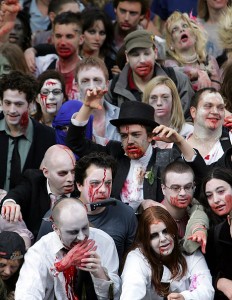 Kim Paffenroth of the Gospel of the Living Dead blog, as well as editor and author of several zombie books, recently made a Facebook post which referenced an interesting item. It is an article at open salon titled “What Does the Zombie Genre Say about the Modern West?”. This piece, by an author listed as RW005g, presents a psychological and sociological analysis of what the prevalence of zombies in popular culture might mean for us in the late modern Western world. The author contrasts scholarly analysis of 1950s horror/science fiction films with its concerns over Communism and conformity (to which we could add the reaction against “Fordism” and rationalization as argued by Mark Jankovich in Rational Fears: American Horror in the 1950s), with the very different social and cultural situation in the West in the late modern period.
Kim Paffenroth of the Gospel of the Living Dead blog, as well as editor and author of several zombie books, recently made a Facebook post which referenced an interesting item. It is an article at open salon titled “What Does the Zombie Genre Say about the Modern West?”. This piece, by an author listed as RW005g, presents a psychological and sociological analysis of what the prevalence of zombies in popular culture might mean for us in the late modern Western world. The author contrasts scholarly analysis of 1950s horror/science fiction films with its concerns over Communism and conformity (to which we could add the reaction against “Fordism” and rationalization as argued by Mark Jankovich in Rational Fears: American Horror in the 1950s), with the very different social and cultural situation in the West in the late modern period.
The author then develops a list of differences between 1950s fears expressed through alien invasion and monster narratives in contrast with our current preferences for the zombie as the monster of the moment. Among the author’s uncomfortable conclusions we read the following:
What does the Zombie Genre tell us about modern America? For starters, it tells us that there is an overwhelming sense of frustration, that the promises of our parents and grandparents about the potential and future of America were, perhaps, not grounded in reality. That we will never reach the promised land.
It also tells us that our real underlying fears today aren’t of some evil foreign aggressor, even a hidden enemy like Osama Bin Laden, but instead, of the overwhelming and totally enveloping spectre of loneliness, of being alone, without friends and family, surrounded by a world that is alien to you and, for all intents and purposes, objectifies you and sees you as something to “use” or consume. It shows us our disconnect from other.
These films also show us our growing anxiety over lawlessness. The images of failed states saturate the air-waves. Images of cities that have ceased functioning, like Sarajevo, Grozny, Mogadishu, and Haiti after the earthquake, like New Orleans after Katrina and Los Angeles during the riots of 1992. A growing sense, awareness of, and sense of powerlessness in regard to a growing section of society that is anarchic and lawless and ruled by gangs, of growing poverty, a growing Lumpenproletariot and concomitant demise of the middle class. Isolated islands of humane civility taking refuge in a growing and ominous ocean of predatory anarchy.
The reader may not agree with everything the author of this open salon piece puts forward, but it does make for interesting food for thought as our fascination with the zombie (as well as [post]apocalyptic) functions as a mirror for our psychological and social state of affairs.





There are no responses yet